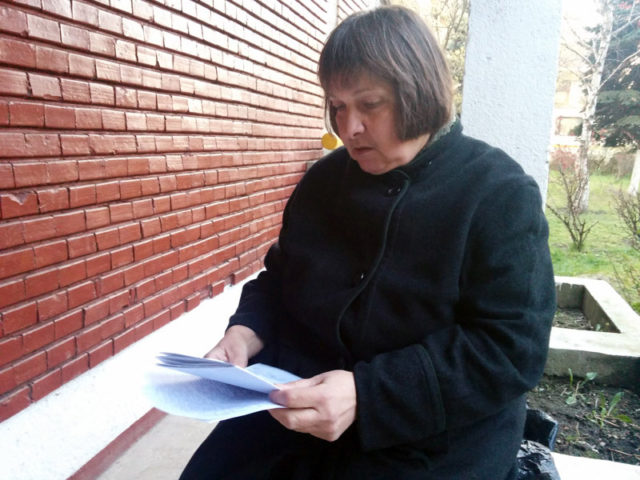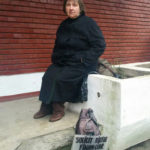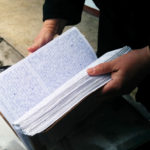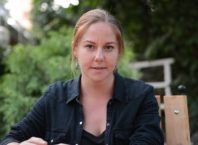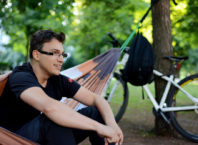I saw her for the first time in the Câmpului region of Cluj-Napoca, not far from Kaufland. She was sitting on the stairs in front of an apartment block. There was a small cart in front of her on which she hanged poster that caught my attention: “Need financial help to survive.”
The message stirred up my curiosity, but I did not have the time to stop then. A month later I met her in the same place, in the same posture. I talked to her and soon I realized that I was in front of a woman with an unusual story.
Visual artist – the niece of the writer Dumitru Almaș
I had an intellectual in from of me, an educated lady. I realized this from the first replies. And when she showed me the manuscript of her novel, I saw she was good at writing. “How is it possible for such a woman to lose everything and end up on the streets?” I asked myself. Perhaps she read the question in my eyes.
“My name is Georgeta Gheorghiu and I am 60 years old. I am a visual artist and I have been living on the street for the last 17 years”.
She paused, sighed and began to tell me the story of her life. I’m going to tell it to you the way I heard it, and the way I managed to build it from the answers she has given me and from the things she had shown me during our discussion.
“My name is Georgeta Gheorghiu and I am 60 years old. I am a visual artist and I have been living on the street for the last 17 years”. This is how she began her story. “I was born in Piatra-Neamț and I am the niece of the writer Dumitru Almaș, a writer known especially for his historical stories.”
“I grew up in Pașcani, where I finished high school where I studied mainly mathematics and physics, but I have always been passionate about drawing. So when I moved to Brasov, I went to the Popular Art School where I studied graphics and visual arts. After my graduation I made a living by drawing portraits: in the summer I went to the seaside, in the Neptun Complex, in the winter I moved to Brașov and Sinaia”.
“I gathered some money for about 10 years and after the fall of the communist regime I decided to buy a house, my own place where I could live in peace when I’m old. I’m old now. Look at me how peaceful I am, begging on the street, counting on the mercy of the people. It is hard to understand and absurd for someone to have a house and still not be able to stay in it, to be forced to live on the street”, she confessed with a bitter smile.
“It is hard to understand and absurd to have a house and still not be able to stay in it, to be forced to live on the street”.
The House near Braşov, the poison and the people from secret police
Then she told me about the Romanian Intelligence Service University in Bran, Braşov County. And about the circles of interest in the area, about the influential people who were doing great business during the Communists, and who became even richer in the 90s due to their influence.
According to her, their goal was to gradually seize different villages in the region and to monopolize certain areas by purchasing houses and land using money, connections, or, if necessary, by using even less legal ways.
“The house I bought is in the village Cristian that is situated halfway between Râşnov and Brasov: a beautiful area with stunning nature that was traditionally inhabited by Saxons. Since I did not have enough money, I made a compromise and accepted to live in the same yard with another owner. At the end of the courtyard, I opened a small shop so that I could earn a living”.
“At that time the other house was inhabited by a Saxon lady. After the fall of Communism, she left the country and sold the house of a family from Bran that was known for numerous robberies subsequently covered by the police. Baciu Gheorghe and Doric – that was their name. This is when I started having problems that culminated with an unjust and absurd judicial decision according to which I lost half of my property”.
“On July 25, 1999, someone put toxic materials in my house. It’s a miracle that I remained alive. I wasn’t able to live in that house since then. I asked for an expertise, we knocked on all the possible doors, but I did not get any results because the area is monopolized by the big shots from the former secret police in Brasov. So in the last 17 years I have been living on the streets without a roof above my head. “
“Brownian Man”
We sat silent for a few minutes. I took notes, trying to digest what I had heard. She sat still then began to look for something in her cart and finally brought out several manuscripts that were carefully wrapped up. “Over the past 17 years I have traveled through different countries in Europe,” she started again. “I hitchhiked a lot. The people who picked me up most of the times were truck drivers.”
“I did not have any money, so I survived the way I could. Over the years I have been in the Netherlands, Belgium, Spain and Italy. I spent 1 year in France and Portugal, and then I returned to Romania. I will write about this in my novel, which I will sign with the pseudonym Inesa. The name of my novel is “Brownian Man”.
“This novel was born out of too much suffering”.
“This novel was born out of too much suffering. It is not my fault: I have done nothing but to tell the facts. If you are tempted to judge me of a sick imagination, just know that the imagination belongs to the criminals who destroyed my life from the shadows and maybe to the “One” that drew me such a destiny. After all I have been through I began to believe very much in destiny. Whatever you do, in the end, everything that has to happen will happen”.
The title is a parallel between physics and my life, between the particles that have an erratic and chaotic movement and my destiny. “The novel consists of 3 volumes (300-400 pages each), some of which are already edited. The text is available to anyone free of charge, provided the reader is willing to pay in order to copy the pages”.
I read a part of the manuscript there on the stairs, in front of the block. I have discovered there a broken destiny, a person dominated by the mania of persecution, who constantly feels that she is being pursued and harassed by the secret police and by shady people who have not let her work and or get a rent, people who sometimes denied her access to the shelters for street people and who have made her be very fearful about doctors, pharmacies and charitable associations.
At the end of our discussion, I offered to buy her some food from Kaufland supermarket. He refused categorically, saying that over the years she had become accustomed to a particular diet and did not accept food from anyone. I tried not to judge her, I gave her 10 lei, I thanked her for the conversation, and I left her there with her lost eyes and the cart with the banner “Need financial help to survive”.


